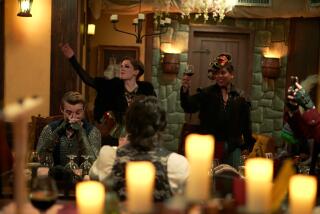McSorley’s Old Ale House: Where words and beer still flow
This is a good place
To stop and rest
Where so many have come
It is right for me
- Geoffrey Bartholomew The poet works behind the bar. Been there 37 years -- 38 this June.
He walked in on his first New York night back in 1967.
FOR THE RECORD:
McSorley’s Old Ale House: An article in the Jan. 31 Section A about the literary side of McSorley’s Old Ale House, the oldest bar in New York City, said that Joseph Mitchell had written a New York Times article about McSorley’s in 1913. Mitchell did not write the article, which was published without a byline. —
This is a good place
He walked out onto 7th Street drunk off his heels, went over to a youth hostel on 3rd Street, and slept if off.
To stop and rest
He was soon a bar regular, and turned his patronage into a job five years later, becoming bartender and bard.
It is right for me
That place he stayed the first night, the youth hostel on 3rd, it isn’t there anymore.
But McSorley’s Old Ale House? Been there 156 years, East Village, just off Cooper Square.
“This place is special because it still exists,” says the poet, Geoffrey Bartholomew.
History lines the walls. Houdini’s handcuffs. Dusty wishbones hung by World War I doughboys wishing to return home safely. A plate commemorating Charles Lindbergh’s 1927 transatlantic flight.
Then there are the frames, holding yellowed newspaper clippings. A New York Herald story reports Lincoln’s assassination. (Lincoln was a customer, you know.)
Words are wallpaper here, so it’s easy to see why McSorley’s has inspired writer after writer to sing of the Bowery bar. Joseph Mitchell made one of the earlier stamps in a 1913 New York Times article, and later in a book, “McSorley’s Wonderful Saloon.”
Then came poetry, notably ee cummings’ 1923 poem “i was sitting in mcsorley’s.”
A sample: “tinking luscious jigs dint of ripe silver with warm-lyish wetflat splurging smells waltz the glush of squirting taps plus slush of foam.”
“The poetry is God-awful. You’ve got to be loaded to understand it,” said Jim Wilk, 41, a regular who works construction in Manhattan.
Perhaps. After four hours of drinking, he said, “All that poem is about is the constant flow of drinks and the constant flow of conversation.”
Bartholomew added his alehouse ode in 2001: “The McSorley Poems: Voices from New York City’s Oldest Pub.” There’s a worn copy behind the bar, where the 64-year-old with thick forearms and a mustache the color of a gray, rainy New York sky works.
He attended the City College of New York’s creative writing program in the ‘70s and earned his master of arts in 1975. While there, he tutored under literary heavyweights Kurt Vonnegut and Anthony Burgess.
“Everybody can take a shot at what you want to do,” he said.
So he wrote. McSorley’s provided the money for the bills, and the environment to create the words.
“Mine, it isn’t going to be so flowery,” he said of his poetry.
“It’s a little dark,” added Teresa Maher de la Haba, McSorley’s first-ever female bartender and daughter of the owner, Matthew Maher. But if the poetry dwells on the dark, that’s understandable. After all, she said, McSorley’s is a bar.
Saloon, really. Sawdust covers the wood floor to keep patrons from slipping on spilled ale. No radio disturbs, no television distracts (except when one of the local teams is in the championship) -- just glowing embers in the potbelly stove in winter, drink, and conversation to pass the time.
McSorley’s follows the city’s breakneck pace: a two-drink menu -- the “light” (a crisp pale ale) and the “dark” (a porter, hints of chocolate) -- two seconds to order and half that to get served. Cash only.
McSorley’s has a couple of mottoes: “Be good or be gone,” and the more infamous one, “Good ale, raw onions and no ladies,” harking back to the days when women weren’t allowed. When a judge ruled in 1970 that McSorley’s must allow women in, it was front-page news.
That’s enough to get the prose flowing. Throw in some of the bar’s characters and you might get published.
Use the silver-haired wise-guy server named Dick Buggy, who used to be an undercover cop, and would go into Central Park dressed as a woman to get mugged. Seriously.
Find him cajoling the ladies with terrible one-liners: “Drink up; you’re easier when you’re drunk.”
For balance, toss in endearing regulars -- the lifeblood of any bar -- such as Jim Wilk and his brother-in-law (they married sisters) Dan McGuire, an accountant from Maryland.
On the day after Christmas for the last eight years, they sit at the same table and talk about the year while gulping down ale from open to close. They even answer the pay phone that rings over their heads.
“I’ve taken down reservations for people in London,” Wilk said.
“I’ve given more directions to this place than directions to my own home,” added McGuire.
Talk to these guys long enough and you want to scribble a poem or attempt a short story. Bartholomew again:
Sun off the shining brass
In early afternoons . . .
This is a good home
“There can always be something new,” he said. “You can always say something different.”
Guess so. He’s working on a second volume.
More to Read
Sign up for our Book Club newsletter
Get the latest news, events and more from the Los Angeles Times Book Club, and help us get L.A. reading and talking.
You may occasionally receive promotional content from the Los Angeles Times.







